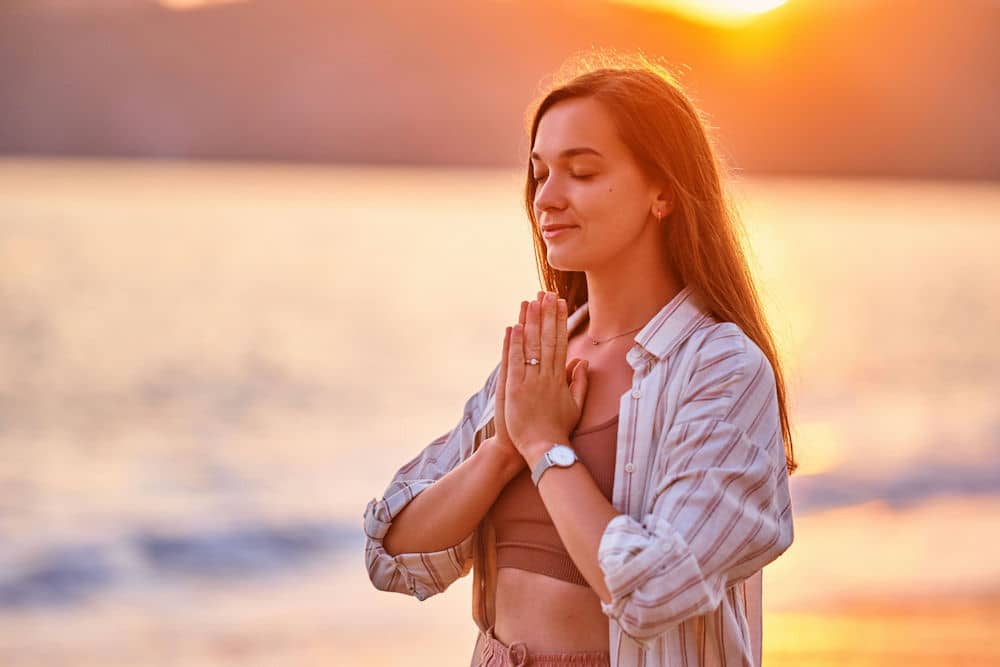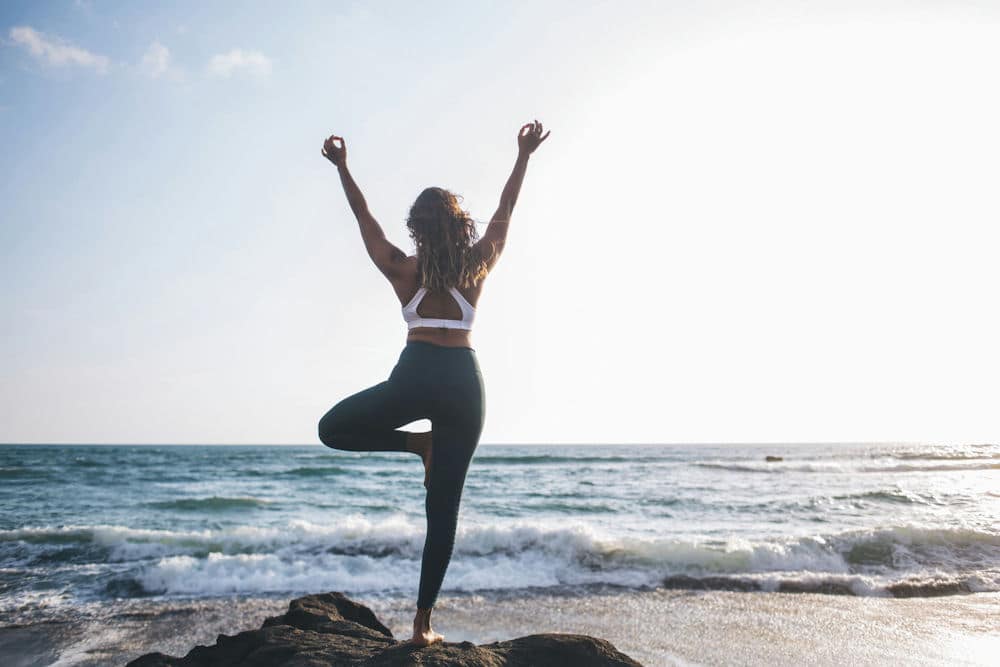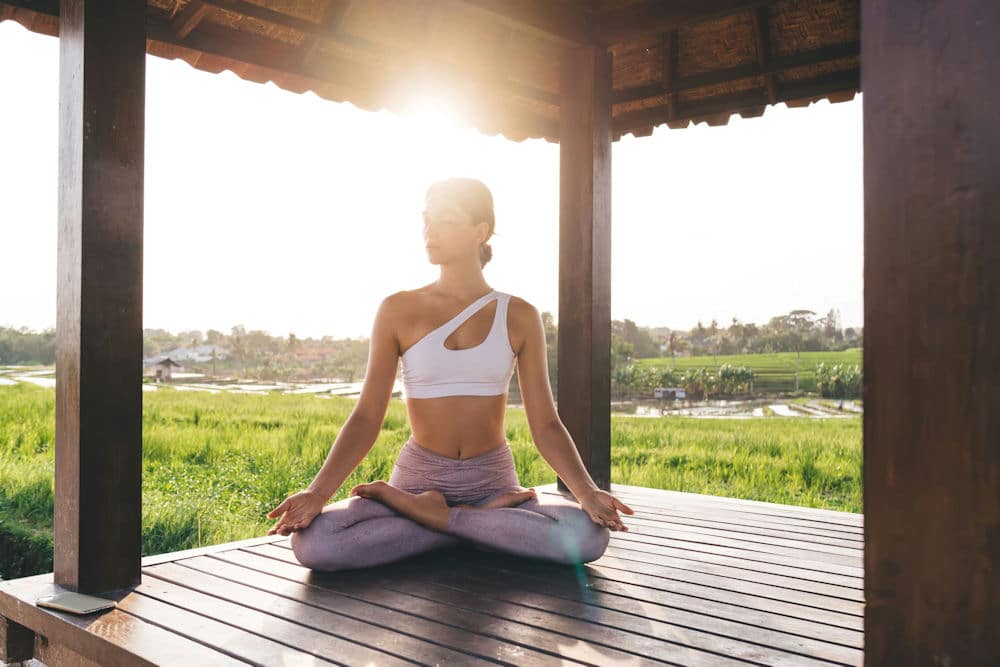
Yoga and meditation are related practices, both of which are extremely helpful for women recovering from addiction, trauma, and mental illness.
More than 5,000 years old, yoga is an ancient Indian philosophy, including moral guidance and practical advice for achieving liberation from suffering. The philosophy of yoga is formulated as eight “limbs” of practice.
The word yoga represents the idea of joining, or union. When we practice yoga, we are choosing to walk down a specific road. Like all roads, the road of yoga leads somewhere. Each yoga session represents a few more steps down the road.
According to the founders of yoga from millennia ago, the road of yoga practice leads home to our own cosmic origins, the benevolent indwelling one source we all came from. It is the perspective of yoga that all of us come from the same origins, and that we will all find our way back home sooner or later. Yoga is offered as a direct path back, for those of us who are ready for that and want that.
Both yoga and meditation are part of the larger yoga philosophy, which encompasses practices of cleansing, and healing breath work that cause the body to heal and balance itself from within (pranayama). It also offers a behavioral path for living mindfully that takes into account the (sometimes easy-to-forget) unity of all living things.
At Villa Kali Ma we use both yoga and meditation to help women recover lives of meaning, joy, and purpose. We have found yoga and meditation work extremely well to restore palpable experiences of union with a deep inner well of peace. This has been true for ourselves and for the women we serve.
What is yoga?

In the West when we say we do yoga, most of us are referring to the branch of yoga practice which involves physical exercises that strengthen, stretch, and tone the body. There are many different variations and schools of yoga that teach the practice of using these asanas, or postures, as a path to well-being.
Many yoga teachers uphold the tradition of practicing mindfulness during postures, and may also guide students through different forms of pranayama (breath work). Some teachers include short seated meditations, but most Western yoga classes center around a sequence of physical postures.
Lucky for us, we can take our pick among the many variations of yoga, following what resonates and feels supportive for us. All forms of yoga asana practices are beneficial for training the body to reside in a state of health and happiness.
Even though asanas like Downward Facing Dog, or Adho Mukha Svanasana, seem like they’re primarily exercises for the physical body, the truth is that each asana works not only the body but the mind, heart, and spirit of the person practicing.
Each posture stretches, tones, twists, cleanses, or stimulates key glands, and nerve plexuses, and activates the deepest body pathways which are responsible for generating feelings of peace and joy. Whether we realize it or not, therefore, yoga is automatically healing and regulating our minds, hearts, and spirits.
What is meditation?
Meditation refers to the practice of being as physically and mentally still as possible (usually in a seated posture) and strengthening inner powers of neutral observation and unwavering focus.
There are many different styles and traditions of meditation, but the general idea is to learn to quiet the mind. Meditation usually has an anchor for the awareness to focus on, and return to after having wandered off, such as placing awareness on the breath.
Meditation has a lot in common with mindfulness but isn’t strictly the same concept. Mindfulness is a broader concept and can encompass other practices of present-moment awareness, such as mindful self-compassion, mindful eating, or mindful movement.
Both mindfulness and meditation are about learning to gently tune one’s powers of awareness towards the present moment and to refrain from identifying with any contents of the mind. Emotions, physical sensations, and thoughts are all compassionately and neutrally observed without grasping onto them, trying to change them, or making an identity out of them.
There are other meditation traditions that aren’t, strictly speaking, the same as the practices articulated by the philosophies of yoga, but there is a lot of overlap. Zen Buddhist meditation and Tibetan Buddhist meditation are relatives of the older Indian meditation practices.
What are the benefits of yoga?
Yoga has many benefits for the mind, body, and soul.
At the physiological level, yoga is a powerful tool that:
- Strengthens the body and builds muscles
- Reduces inflammation
- Relieves stress and regulates the nervous system
- Improves flexibility, mobility, and balance
- Combats depression and reduces anxiety, regulating mood
- Boosts immunity
- Promotes healthy sleep
- Improves cardiovascular health
Because yoga promotes mindfulness and clarifies focus, in part through the benefits of breath work and the impacts of yoga positions on adrenal and other body systems, yoga improves mental and cognitive abilities. Some mental benefits include:
- Greater ability to clear the mind of brain fog or scattered thoughts
- Improved single-minded focus and concentration
- Choice in one’s thoughts, greater ability to refrain from indulging in a negative thought
- Greater ability to become absorbed in a flow state
The psychological impacts of yoga are also many, and include some of the following benefits:
- Stay calm in the face of potential nervous system triggers
- Deeper peace and feelings of wellbeing
- Stay in the now moment
- Feel your feelings and feel your body
- Sense of connection to life and oneself
What are the benefits of meditation?
Like yoga, meditation has many benefits to the health of mind, body, and soul, in part because of its powerful effects on the nervous system. Meditation is known to:
- Reduce general anxiety and control panic attacks
- Combat stress, including the inflammation and toxicity to the body created by stress
- Deal with difficult situations without going into states of fight-flight
- Longer attention span, better memory, and restored ability to focus
- Healthier sleep
- Pain management
- Lower blood pressure
Villa Kali Ma offers yoga and meditation

At Villa Kali Ma we incorporate both yoga and meditation into our offerings. The philosophy of yoga guides our program, and the practical tools learned through practicing asanas, breath work, mindfulness, and meditation are valuable assists for learning to live a happy life in recovery. The great Indian sages, who wrote their advice for living well down over 5,000 years ago, saw deeply into the heart of the suffering of humans, and also into its enduring cure.

